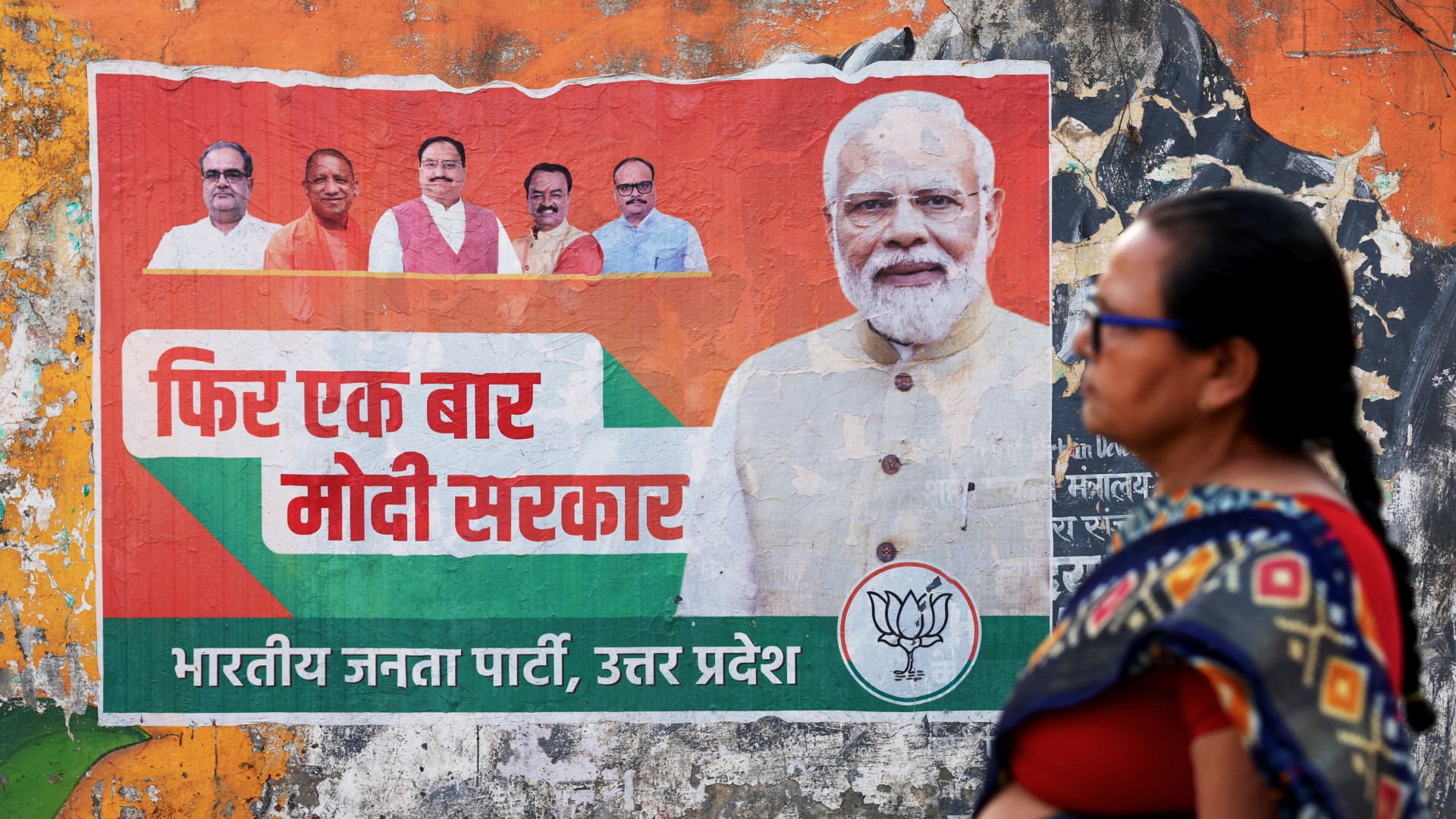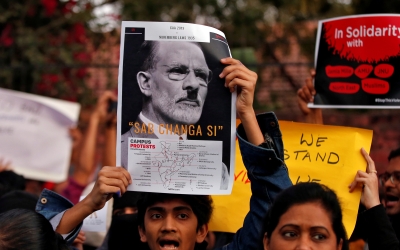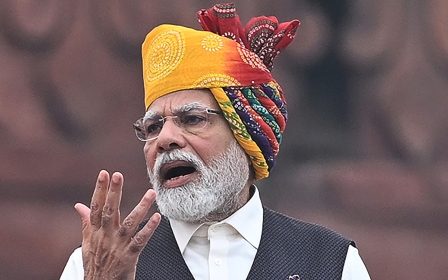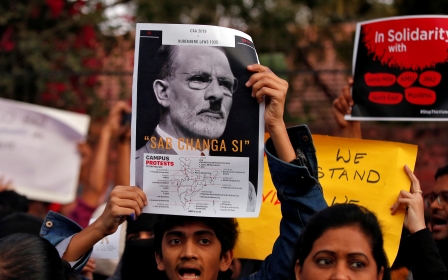India elections: Vying for a third term, Modi is turning India into a Hindu nation

As India gears up for crucial parliamentary elections, with Prime Minister Narendra Modi vying for a third term, his Hindu nationalist government has announced plans to enforce the controversial anti-Muslim law it passed in 2019.
The Citizenship Amendment Act (CAA) accelerates the process of Indian citizenship for immigrants belonging to Hindu, Sikh, Buddhist, Jain, Parsi, and Christian communities fleeing religious persecution from Pakistan, Bangladesh, and Afghanistan.
Amit Shah, India's union home minister, stated that the law will enable minorities persecuted on religious grounds in neighbouring countries to acquire Indian citizenship, claiming that Modi has "delivered on another commitment".
New MEE newsletter: Jerusalem Dispatch
Sign up to get the latest insights and analysis on Israel-Palestine, alongside Turkey Unpacked and other MEE newsletters
But with almost a billion people eligible to vote in just a few weeks, this decision is seen as a strategic appeal to Modi's Hindu support base while simultaneously intensifying the voter polarisation that has come to define Indian politics.
The implementation of the CAA has been one of the central issues for Modi's ruling Bharatiya Janata Party (BJP), forming a major part of its 2019 election manifesto. Critics of the act argue that the religion-based legislation, which excludes minority Muslims and threatens to render them stateless, is deeply discriminatory.
Opposition parties have questioned the timing of the government's move, alleging that they are designed to incite religious divisions among voters. India's principal opposition Congress party said that the CAA was notified just one month before the general elections to polarise voters.
"The Modi government's decision to implement rules under the CAA appears to be a deliberate attempt to heighten communal polarisation for electoral gains," said Sitaram Yechury of the Communist Party of India (Marxist). Asaduddin Owaisi, the leader of the All India Majlis-e-Ittehadul Muslimeen party, also questioned the timing, stating that the law is only meant to target Muslims.
Amnesty International has characterised the Citizenship Amendment Act as 'a bigoted law' that legitimises discrimination on the basis of religion
On 11 March, both the US government and the United Nations expressed concerns about India's citizenship law. A spokesperson for the UN High Commissioner for Human Rights declared the 2019 act as "fundamentally discriminatory in nature and in breach of India's international human rights obligations".
The Biden administration also voiced concerns about the announcement and said it was "closely monitoring" how the act would be implemented.
In response, India's Ministry of External Affairs said that the CAA was an "internal matter" and criticised the US State Department's statement as "misplaced, misinformed and unwarranted".
Amnesty International, however, characterised the citizenship act as "a bigoted law" that legitimises discrimination on the basis of religion. "Its operationalisation is a poor reflection on the Indian authorities as they fail to listen to a multitude of voices critical of the CAA - from people across the country, civil society, international human rights organisations and the UN," it added.
Rights groups in India are challenging the act in the Indian Supreme Court, arguing that it contravenes the country's secular tradition and violates the constitution. Over 200 petitions challenging the act have been pending in the top court since December 2019.
A bigoted 'anti-Muslim' law
The Citizenship Amendment Act is an amendment to India's Citizenship Act of 1955. The CAA entitles non-Muslim immigrants from three neighbouring Muslim-majority countries - Afghanistan, Pakistan and Bangladesh - to citizenship if they are facing religious persecution and entered India illegally before 31 December 2014.
The legislation has reduced the residence requirement for the naturalisation of eligible migrants from 12 years to just six.
Many critics underline that the bill specifically excludes Muslims and unfairly makes religion a condition for applying for citizenship. This, they say, is a violation of Article 14 of the Indian constitution, which guarantees the right to equality.
The Indian parliament enacted the CAA on 11 December 2019, and subsequently, the Modi government announced plans to establish a National Population Register (NPR) by September 2020, laying the groundwork for the implementation of a National Register of Citizens (NRC) nationwide.
The NRC is a cornerstone of the Modi government's initiative to identify and remove individuals it alleges entered India unlawfully. Initially deployed solely in the northeastern state of Assam, Modi's ruling BJP pledged to extend a comparable citizenship validation initiative across the country.
Prior to this, in June 2019, the government had authorised the establishment of "Foreigners Tribunals" across India. Collectively, these measures form a framework that could potentially target Muslims. Those who may find themselves excluded from the NRC list may face proceedings in Foreigners Tribunals, which have the authority to strip individuals of their citizenship and hold them in detention centres.
This creates a scenario wherein only religious groups specified in the CAA could safeguard their citizenship, while Muslims risk being rendered stateless.
Some have critiqued the CAA's integration of religious criteria into its naturalisation and refugee policies as inconsistent with the nation's founding as a secular republic. Others have likened it to Myanmar's citizenship law of 1982 - the origin of the ongoing Rohingya crisis and potential genocide.
The CAA, coupled with the proposed NRC, has further evoked eerie recollections of Nazi Germany's Nuremberg Laws of 1935, which targeted individuals based on their religion. The famed Indian author Arundhati Roy was among those who expressed their dismay at the new legislation and said that India was facing its "biggest challenge since independence".
She asked: "Are we going to stand in line once again, obediently, and comply with the policy that eerily resembles the 1935 Nuremberg laws of the Third Reich?"
BJP's dog-whistle politics
The CAA's implementation had been paused after widespread protests against the law erupted in 2019. The protests drew people from diverse backgrounds who maintained that the legislation eroded India's secular foundations.
In the heart of the national capital, which emerged as a major site for anti-CAA demonstrations, hundreds of predominantly women protesters staged sit-ins and protests against the act. The protests unfolded notably in Muslim-majority neighbourhoods like Shaheen Bagh and Jamia Nagar.
Days after the public took to the streets to protest against the CAA, Modi ignited communal sentiments by suggesting that only Muslims were protesting the law and instigating potential violence against them: "Unke kapdon se pata chal jata hai (They can be identified by the clothes they are wearing)," he said at an election rally in Jharkhand state in northeastern India.
Days later, CT Ravi, a senior BJP leader in the South India state of Karnataka, outright threatened protesting Muslims with Gujarat-like violence if they continued to dissent against the CAA.
Several other BJP officials used incendiary slogans and characterised the people protesting against the CAA and NRC as disloyal. BJP leader Kapil Mishra led a rally in support of the CAA in Delhi, where he shouted slogans such as "Goli maaron saalo ko (Shoot the bastards)". The slogans implied that anti-CAA protesters were traitors and called on the police to shoot them.
A week later, Delhi witnessed communal violence in the northeast region that lasted several days and killed more than 53 people, mostly Muslims. India's law enforcement agencies cracked down on protestors, many of whom are still languishing in jails.
Hindutva vision for Muslims
With the ruling BJP government's latest move to enforce the CAA and the recent inauguration of the Ram temple at a contentious site where a historic mosque once stood, Modi has made clear that his bid for a third term will be anchored on delivering key elements of the Hindutva agenda. These developments further expose Modi's intent to politically mobilise Hindu voters along the Hindu-Muslim divide in the run-up to the election.
Modi's push for the citizenship law's implementation comes despite opinion polls predicting a sweep for his ruling BJP
"At the heart of the BJP's strategy lies a twofold objective: first, to solidify its support base among the Hindu electorate by reaffirming its commitment to Hindutva, and second, to showcase Prime Minister Modi as a stalwart leader who delivers on his promises, particularly in matters concerning nationalism and the welfare of Hindus," argues political analyst Sayantan Ghosh.
Modi's push for the citizenship law's implementation comes despite opinion polls predicting a sweep for his ruling BJP. This suggests that he is specifically addressing the BJP's core ideological commitments, which include the abolition of Article 370 in the contentious Jammu and Kashmir region and the construction of the Ram Mandir in Ayodhya.
The CAA thus aligns with the sectarian agenda of the Rashtriya Swayamsevak Sangh (RSS), a far-right Hindu organisation to which Modi has long been affiliated.
Be it the beef lynchings, "love jihad" conspiracy theories, anti-conversion laws, bulldozer politics or the ghettoisation of Muslims, the BJP is rapidly inching its way towards the realisation of Hindu Rashtra - a Hindu nation in which rules, regulations and legal proceedings are based on the principles of Hindu beliefs and scriptures.
The enforcement of the CAA follows this trajectory and further disenfranchises Muslims as second-class citizens.
The views expressed in this article belong to the author and do not necessarily reflect the editorial policy of Middle East Eye.
Middle East Eye delivers independent and unrivalled coverage and analysis of the Middle East, North Africa and beyond. To learn more about republishing this content and the associated fees, please fill out this form. More about MEE can be found here.






